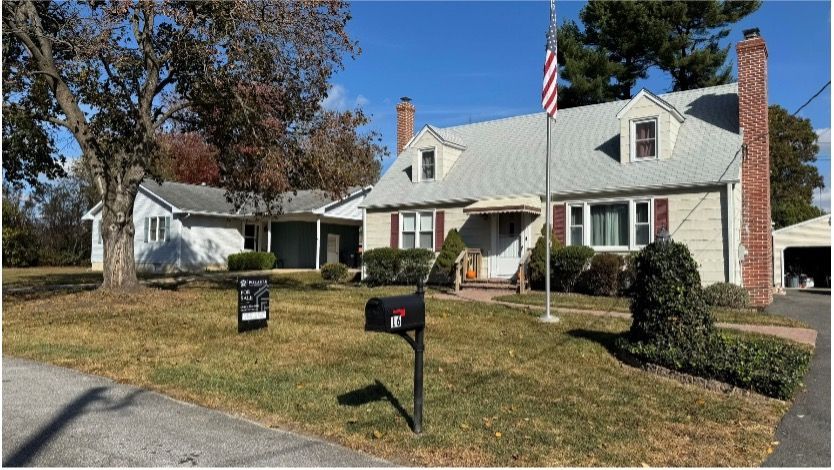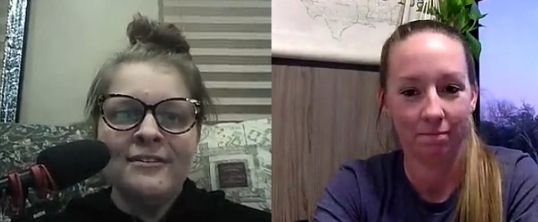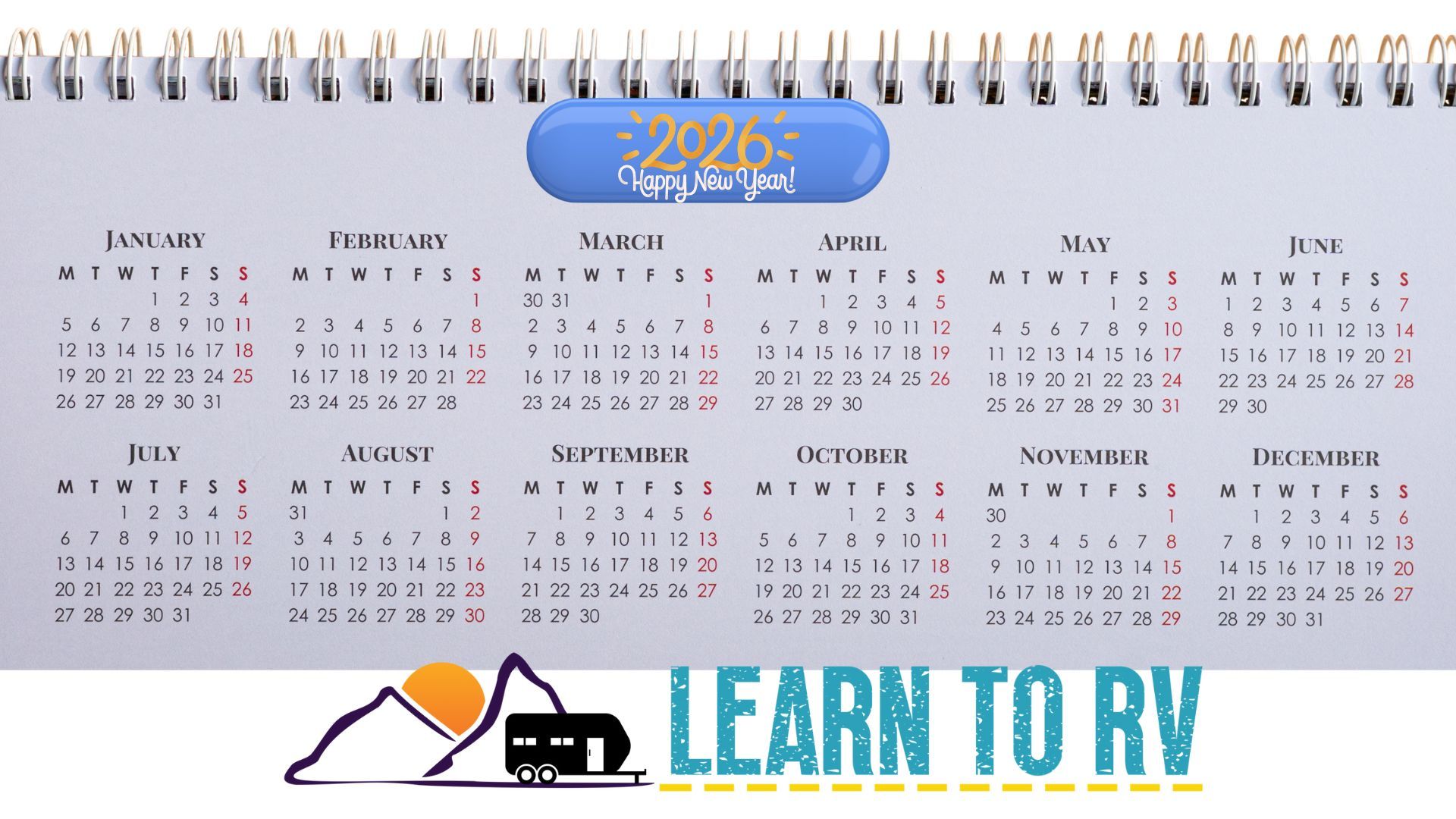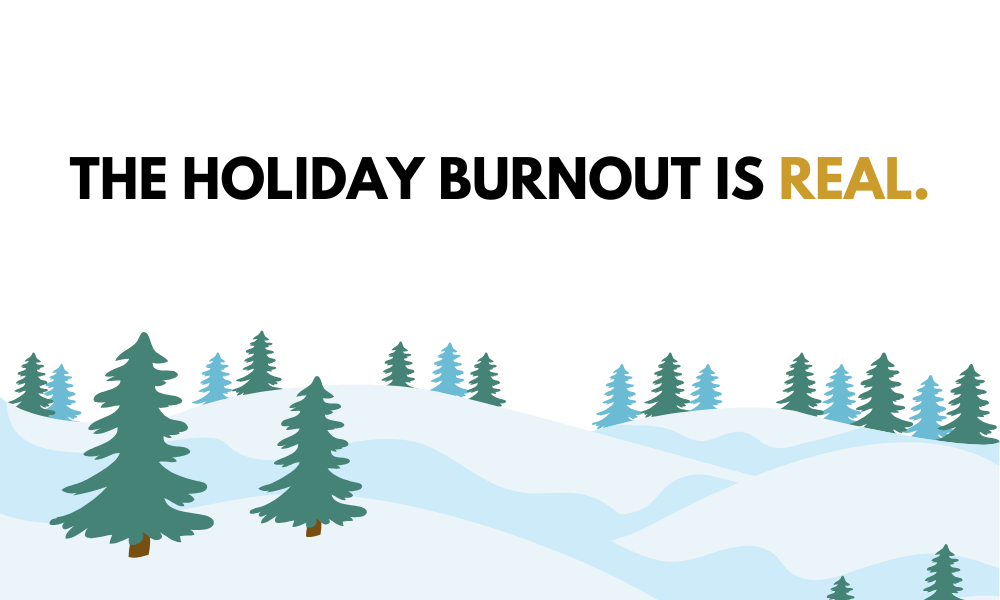Workamping Jobs: How to Find & Land Camp Host Positions
Jennifer+ Aggio • November 21, 2025
Picture this: You're waking up in your RV at a beautiful national park, sipping your morning coffee with a view of the mountains. You spend a few hours greeting campers, answering questions, or doing light maintenance around the campground. The rest of your day? Exploring trails, meeting fellow RVers, and enjoying free camping with full hookups. Oh, and you're getting paid for it.
That's workamping.
And if you want to land one of these positions for summer, you need to start applying the fall prior.
Here's the reality: the best workamping and camp hosting jobs for are being posted and filled months in advance. National parks, state parks, and popular private campgrounds hire 3-6 months in advance.
This guide covers everything you need to know to find and land a workamping position: what it is, when to apply, where to find jobs, how to get hired, and what to ask before accepting.
The clock is ticking. Next season’s positions are being filled right now.
Let's get you on the road to your best workamping season yet.
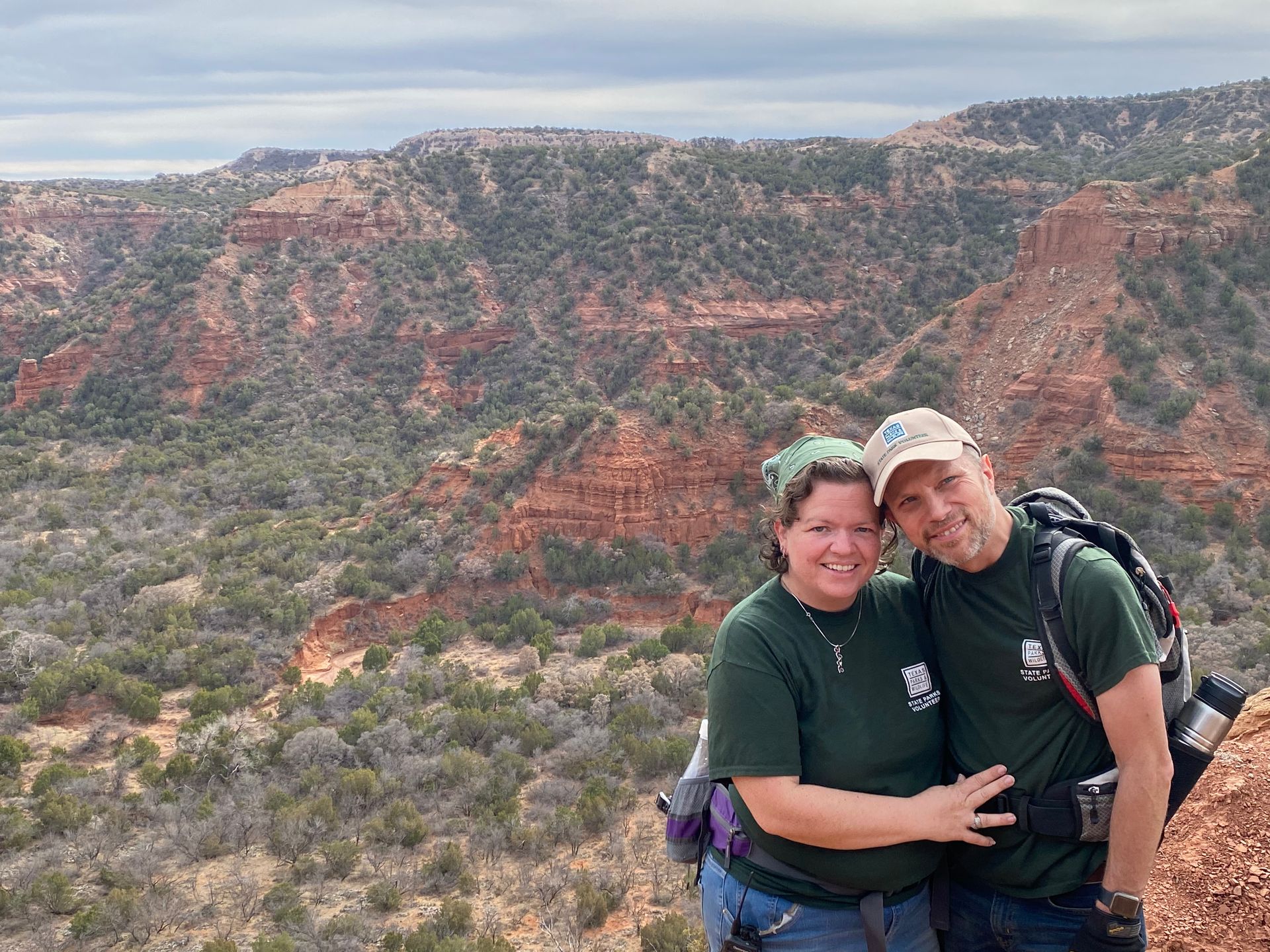
Want to hear real workcamping stories and insider tips?
We just released a companion podcast episode to this blog: Workcamping 101: Finding Your Perfect Seasonal Gig—available exclusively on our Patreon. We dive deeper into finding jobs, what to expect, and share real experiences from the road that didn't make it into this blog.
You can listen for FREE! Just become a free subscriber on Patreon to access this episode and more.
What is Workcamping and Camphosting?
If you've ever dreamed of traveling the country in your RV without draining your bank account, workcamping might be your answer.
Workcamping is when RVers work at campgrounds, RV parks, or outdoor recreation businesses in exchange for free camping, hookups, AND pay. You're an employee earning hourly wages, stipend, or a salary while living on-site.
Camphosting is when you volunteer at a campground in exchange for free camping only, and duties can vary.
Both offer incredible opportunities to travel, save money, and explore places you might not otherwise afford. The difference is whether you need income or are simply looking for free camping.
Who Can Workcamp or Camphost?
You don't need an RV to workcamp! While many positions are designed for RVers with their own rigs, some campgrounds, national parks, and resorts provide employee housing—dorms, cabins, or shared accommodations—for workcampers without RVs.
You'll find:
- Retirees looking for adventure and income
- Couples traveling together (with or without RVs)
- Solo travelers seeking community and purpose
- Full-timers looking for seasonal income
- Part-timers who workcamp during summer or winter
- Non-RVers who want to experience the lifestyle before committing to a rig
No age restrictions—just a willingness to work or volunteer.
Why Workcamp or Camphost?
- Save money – Free campsites can save $1,000+ per month
- Earn income (workcamping) – Many positions pay well plus your site
- Explore bucket-list destinations – Stay at national parks and resort towns affordably
- Build community – Meet fellow RVers and make lifelong friends
- Stay longer – Settle in and truly experience a location
What's the Catch?
You're working (or volunteering). It's not a vacation. Positions vary widely in quality, pay, and expectations. Physical work is common. And you're tied to one location for the duration of your commitment.
The key? Do your research, ask the right questions, and know what you're signing up for.
Now let's talk about when to apply and where to find the best positions.
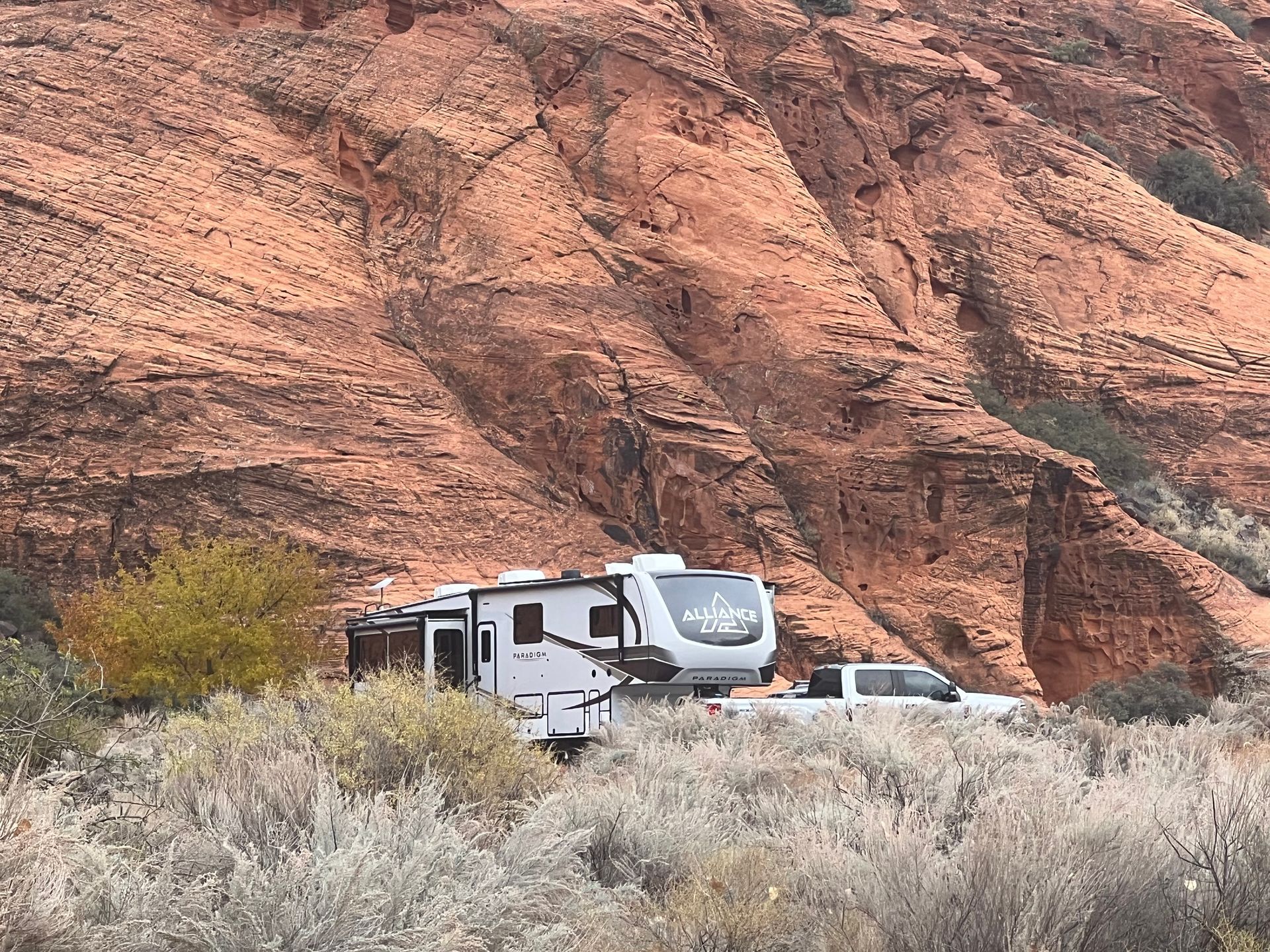
When to Apply for Workcamping Jobs
Timing is everything when it comes to landing the best workcamping and camphosting positions. The most sought-after jobs—national parks, popular destinations, and prime seasonal spots—fill up fast. If you want your pick of positions, you need to understand the hiring timeline.
The Workcamping Hiring Timeline:
Summer Positions
Applications open and hiring happens in the fall and early winter (September through January). Popular positions fill 6 months in advance, sometimes even a year for competitive spots like Yellowstone, Grand Canyon, or Alaska.
Winter Positions
Applications open and hiring happens in the late spring and summer (May through August). Warm-weather winter destinations like Arizona, Texas, and Florida fill quickly. Truthfully Florida is incredibly hard to break into, you will want to apply to Florda at least a year in advance for a winter position or plan on spending a summer there to get on their good side to land a winter position.
The Golden Rule: Apply 3-6 Months Ahead
If you want the best selection, start your search at least 3-6 months before your desired start date. Waiting until the last minute limits your options and puts you in competition with other late applicants scrambling for whatever's left.
There Can Be Last-Minute Openings
Life happens. Workcampers cancel, plans change, and unexpected openings pop up. If you're flexible and willing to jump on short notice, you might snag a great position at the last minute.
Start Early, Stay Flexible
The earlier you start your search, the more options you'll have. But flexibility helps too. If you're open to different locations, job types, or start dates, you'll increase your chances of landing a great position—even if you're applying later in the season.
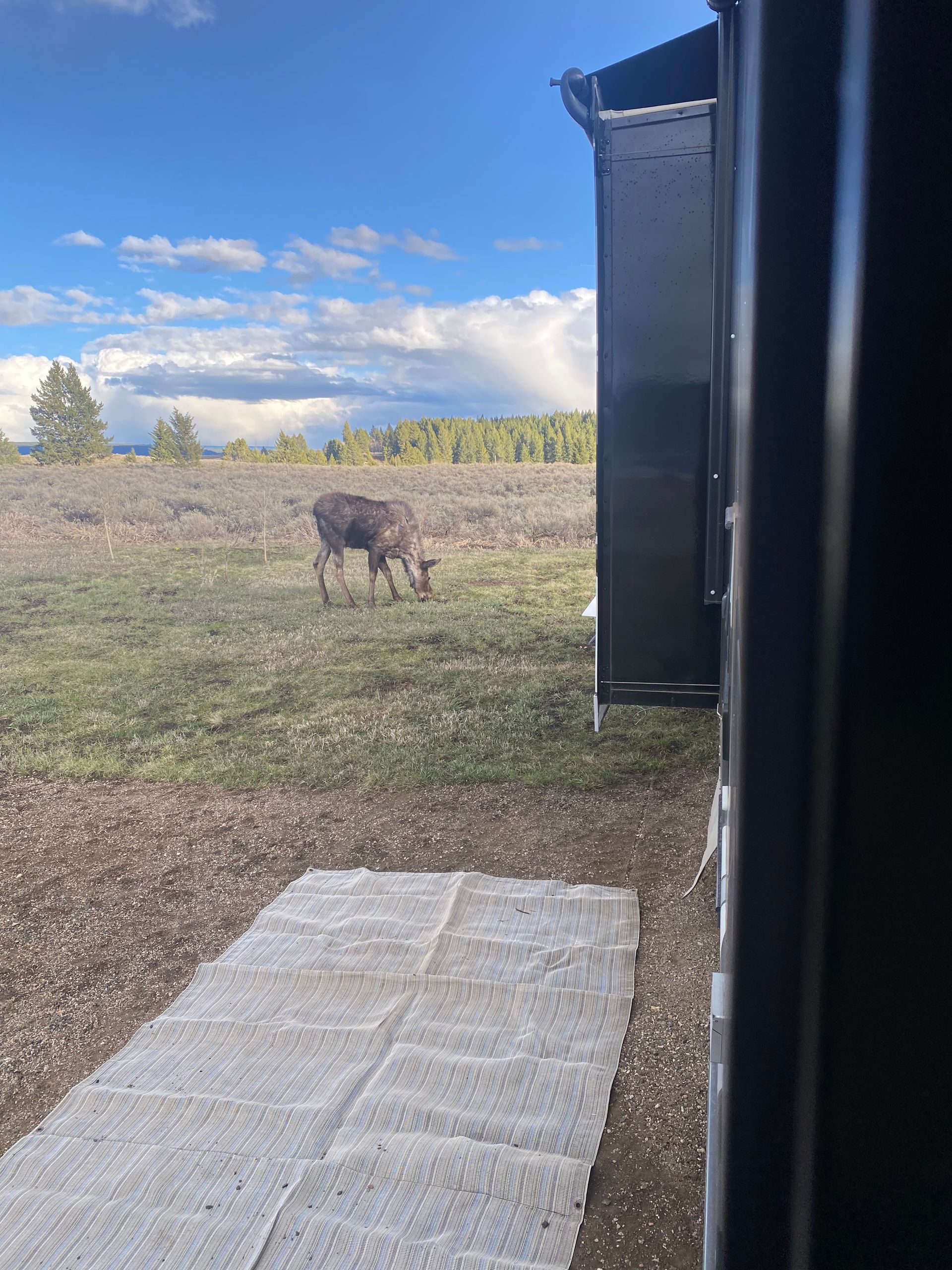
Ready to dive deeper into workcamping?
This blog just scratches the surface. Over on our Patreon, we've got an exclusive podcast episode—Workcamping 101: Finding Your Perfect Seasonal Gig—where we share stories, answer common questions, and talk about what it's REALLY like to land and work your first gig.
The best part? It's completely FREE to join as a subscriber and start listening.
Where To Find Workcamping Jobs
Finding workcamping and camphosting positions doesn't have to be overwhelming. There are dozens of resources, job boards, and websites dedicated to connecting RVers with seasonal work. Here's where to start your search.
Top Workcamping Job Boards
1. Workamper News
Website: https://www.workamper.com
The gold standard for workcamping jobs. Workamper News is a paid subscription service that gives you access to hundreds of workcamping and camphosting listings across the country.
What you get:
- Detailed job descriptions with pay, hours, and requirements
- Daily "Hotline Jobs" email with new listings
- Job alerts by state
- Listings for national parks, state parks, private campgrounds, and RV resorts
- Employer reviews from past workcampers
- Downloadable job magazines
- Access to Workamper Academy courses and resources
- Free 30-day trial (with delayed job listings)
Why it's worth it: This is the most comprehensive workcamping resource available. The listings are detailed, updated daily, and include positions you won't find anywhere else. Many experienced workcampers swear by this subscription—it pays for itself if you land even one position.
2. Workers on Wheels
Website: https://www.workersonwheels.app
A modern job board and app designed specifically for RVers looking for workcamping and seasonal work opportunities.
What you get:
- User-friendly app and website interface
- Job listings across the country
- Ability to search by location, job type, and compensation
- Direct communication with employers
Why it works: It's designed with RVers in mind, making it easy to search and apply for positions on the go.
3. CoolWorks
Website: https://www.coolworks.com
CoolWorks focuses on seasonal jobs at national parks, state parks, resorts, ranches, and outdoor recreation businesses. Many listings include workcamping positions.
What you get:
- Jobs at iconic locations (Yellowstone, Glacier, Grand Canyon, etc.)
- Seasonal and year-round positions
- Employee housing options (great if you don't have an RV yet)
Why it's worth checking: CoolWorks has some of the most scenic, bucket-list workcamping opportunities available.
4. Volunteer.gov (Volunteer Programs)
Website: https://www.volunteer.gov/s/
The official site for federal volunteer programs, including camphosting positions at national parks, national forests, and Bureau of Land Management (BLM) land.
What you get:
- Volunteer camphosting positions (no pay, just free camping)
- Listings for Forest Service, National Park Service, BLM, and more
- Application process directly through the site
Why it's great: If you're looking for free camping in stunning locations and don't need income, this is your go-to resource.
5. Individual Campground and RV Park Websites
Many campgrounds and RV park chains post job openings directly on their websites. Check the "Employment," "Careers," or "Work With Us" pages.
Campground chains to check:
- KOA (Kampgrounds of America): https://workatkoa.com
- Thousand Trails: https://www.thousandtrails.com/careers
- Jellystone Parks: https://www.campjellystone.com/about/employment
Why this works: You're applying directly with the employer, and you can target specific campgrounds or regions you're interested in.
6. State Park Websites
Website: https://www.stateparks.org/locate-a-park/
Many state parks hire seasonal workcampers and volunteers directly. Use the State Parks locator to find parks in your desired area, then visit their individual websites to look for "Volunteer," "Camphost," or "Seasonal Jobs" pages.
Why it's great: State parks often offer beautiful locations, steady camphosting opportunities, and a chance to work in some of the country's most scenic areas.
7. Facebook Groups
Facebook has active workcamping communities where employers post jobs and workcampers share tips, reviews, and experiences.
Groups to join:
- We Need Workcampers
- WorkCamped
- The Camphosts
- Workcamping Jobs with Wages
- Workcampers
- Workcamping in the USA
Why it helps: Real-time job postings, insider tips, and honest reviews from people who've worked the positions.
8. Word of Mouth & Networking
Some of the best workcamping gigs never get posted online. Campground managers often hire based on referrals from current or past workcampers.
How to leverage this:
- Talk to other workcampers at campgrounds
- Ask campground managers if they're hiring (even if nothing's posted)
- Join RV rallies and meetups where workcampers gather
- Build relationships—many workcampers return to the same locations year after year
Pro Tips:
- Apply to multiple positions – Don't put all your eggs in one basket. Apply to 5-10 positions to increase your chances.
- Start early – The best positions fill fast. Begin your search months in advance.
- Read reviews – If possible, research what past workcampers say about the employer. Workamper News and Facebook groups are great for this.
- Be flexible – If you're open to different locations, job types, or start dates, you'll have more options.
- Follow up – After applying, follow up with a polite email or phone call to show interest and keep your application top of mind.
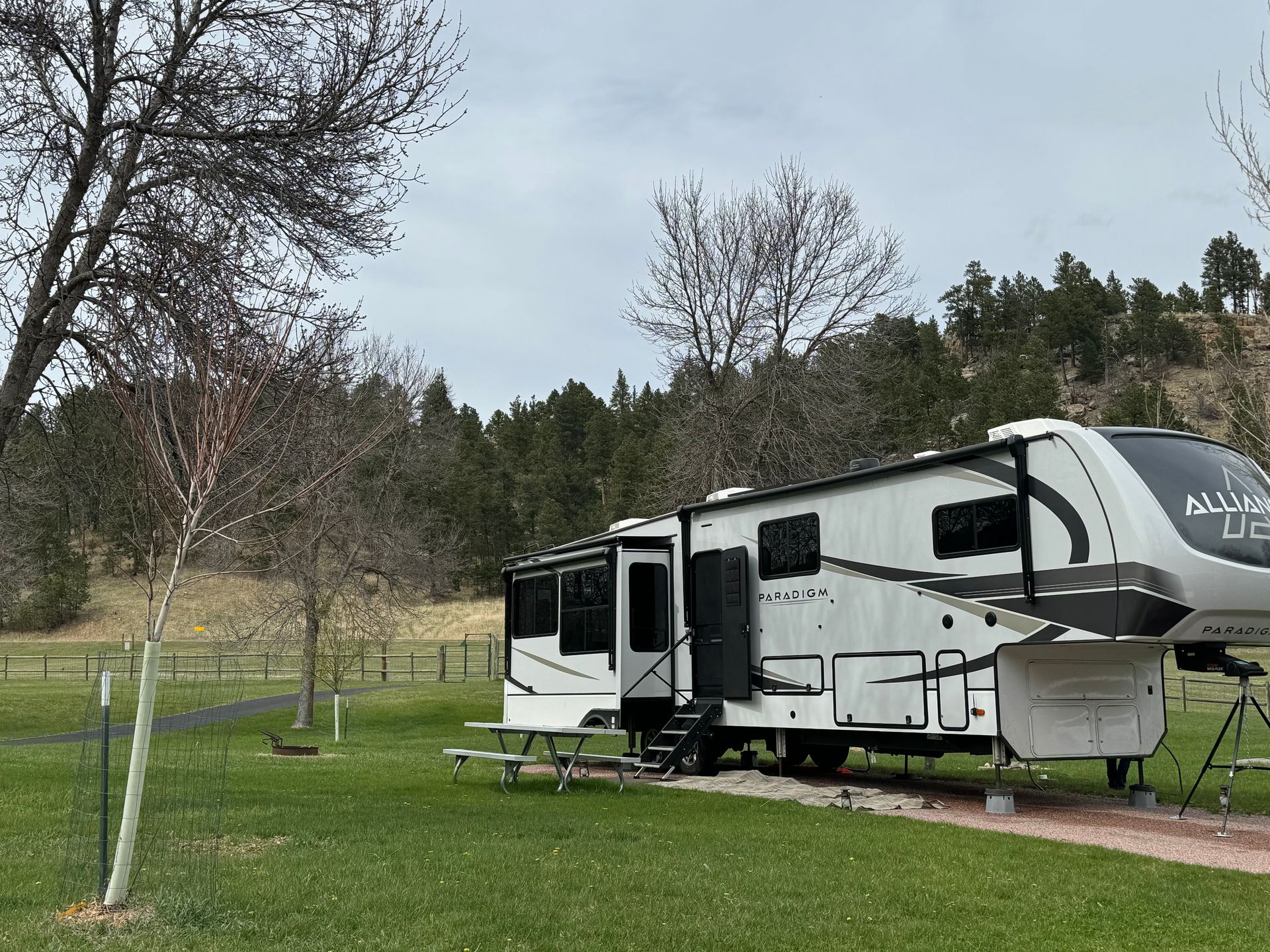
How To Apply for Workcamping Jobs
Landing a workcamping position starts with a strong application. Campground managers receive dozens (sometimes hundreds) of applications for popular positions, so making yours stand out matters. Here's how to put your best foot forward.
What to Include in Your Application:
RV Type and Length
Campgrounds need to know you'll fit. Include your RV type (motorhome, fifth wheel, travel trailer, van) and exact length. Some campgrounds have length restrictions or site limitations, so being upfront saves everyone time.
Note: If you don't have an RV, mention that too! Some positions provide employee housing like dorms or cabins.
Availability Dates
List your start and end dates clearly. Be realistic—if you're looking for a paid position, plan on working at least the full season. Also, be flexible on start and end dates if you can. Campgrounds appreciate workcampers who can commit to their needs.
Skills and Experience
Highlight relevant experience: customer service, maintenance, hospitality, retail, groundskeeping, or any job that demonstrates reliability and people skills. Even if you've never workcamped before, your past work experience matters.
References
Include 2-3 professional references, especially if you're new to workcamping. Past employers, volunteer coordinators, or anyone who can vouch for your work ethic and reliability.
Flexibility
Can you extend your stay if needed? Are you willing to work weekends or holidays? Campgrounds value flexibility, and mentioning it can give you an edge over other applicants.
Resume Tips:
Your resume doesn't need to be fancy, but it should be clear, organized, and relevant.
Highlight relevant experienceFocus on customer service, maintenance, hospitality, retail, or any role that shows you're dependable and good with people. Even volunteer work counts.
Mention RV experience if you have it
Have you lived in an RV before? Traveled extensively? Managed your own repairs or maintenance? Campgrounds want to know you can handle RV life and troubleshoot basic issues.
Include volunteer work
Camphosting and workcamping positions value people who give back. If you've volunteered anywhere—church, schools, community centers—include it.
Keep it concise
One page is plenty. Campground managers are busy—they want to see your experience quickly.
Here is an example of a recent resume I used, I also like to include a picture of us and our rig just to show we aren't scary people and we keep a clean setup.
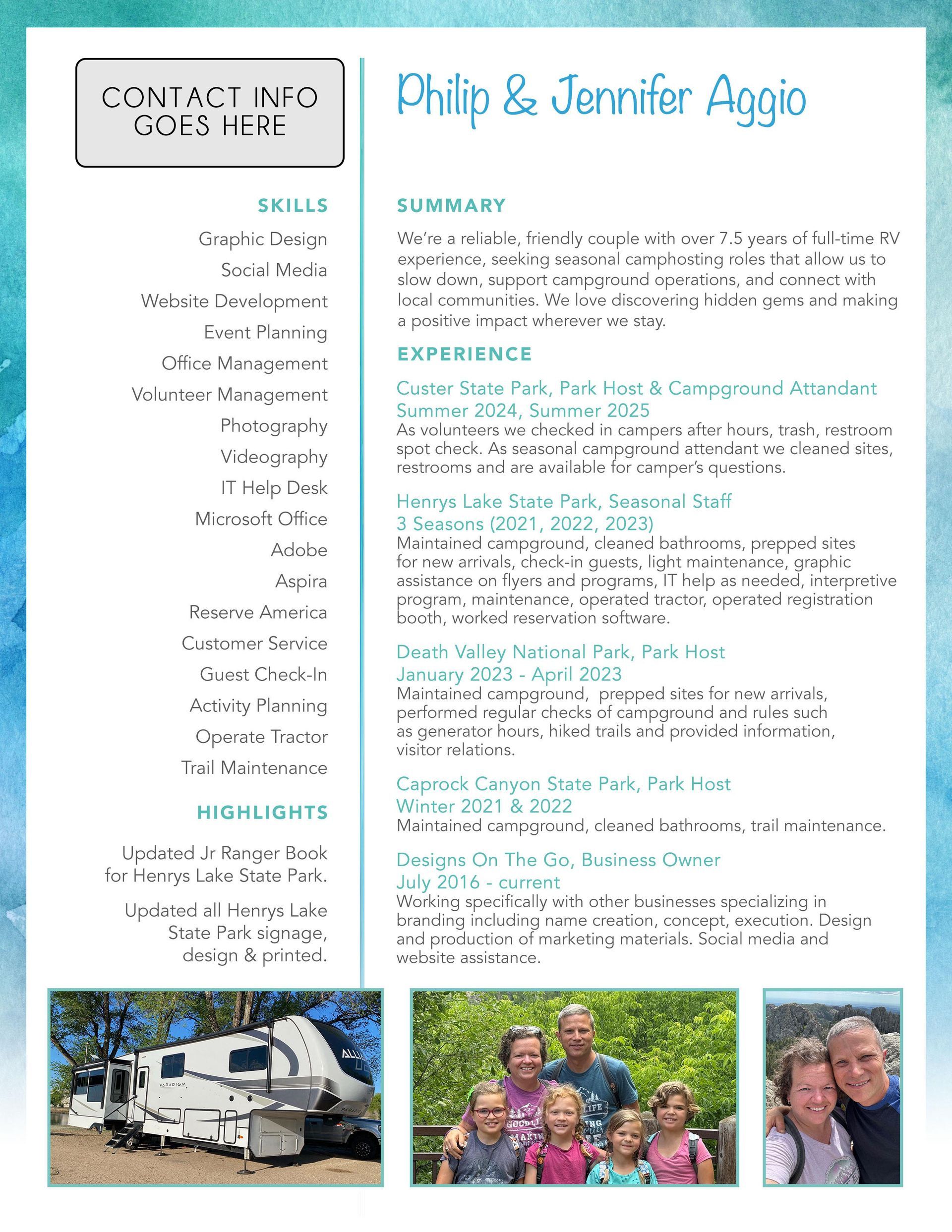
Cover Letter Tips:
A short, personalized cover letter can make all the difference. Don't skip this step—it shows you're serious.
Why you're interested in THIS campground
Don't send a generic letter. Mention the specific campground by name and why you want to work there. Maybe it's the location, the mission, the activities offered, or the reviews you've read. Be genuine.
What skills you bring
Briefly highlight 2-3 skills or experiences that make you a great fit. Keep it relevant to the position.
Your RV setup and self-sufficiency
Mention your RV type, length, and that you're self-sufficient (you have your own home, you maintain it, etc.). Campgrounds want to know you won't be a burden.
Example Cover Letter Snippet:
Dear [Campground Manager's Name],
We're writing to express our interest in the Camp Host position at [Campground Name] for the summer season. We've been full-time RVers for five years, traveling in our 35' fifth wheel, and we're drawn to [specific reason—beautiful location, family-friendly atmosphere, etc.].
With my background in retail management and my partner's experience in hospitality, we bring strong customer service skills, a friendly attitude, and a willingness to pitch in wherever needed. We're self-sufficient, maintain our own RV, and are comfortable handling light maintenance tasks.
We'd love the opportunity to contribute to your team and help create a welcoming environment for your guests. We're available from May 1 through September 30 and are flexible with our schedule.
Thank you for considering our application. We look forward to hearing from you.
Sincerely,
John & Jane Doe
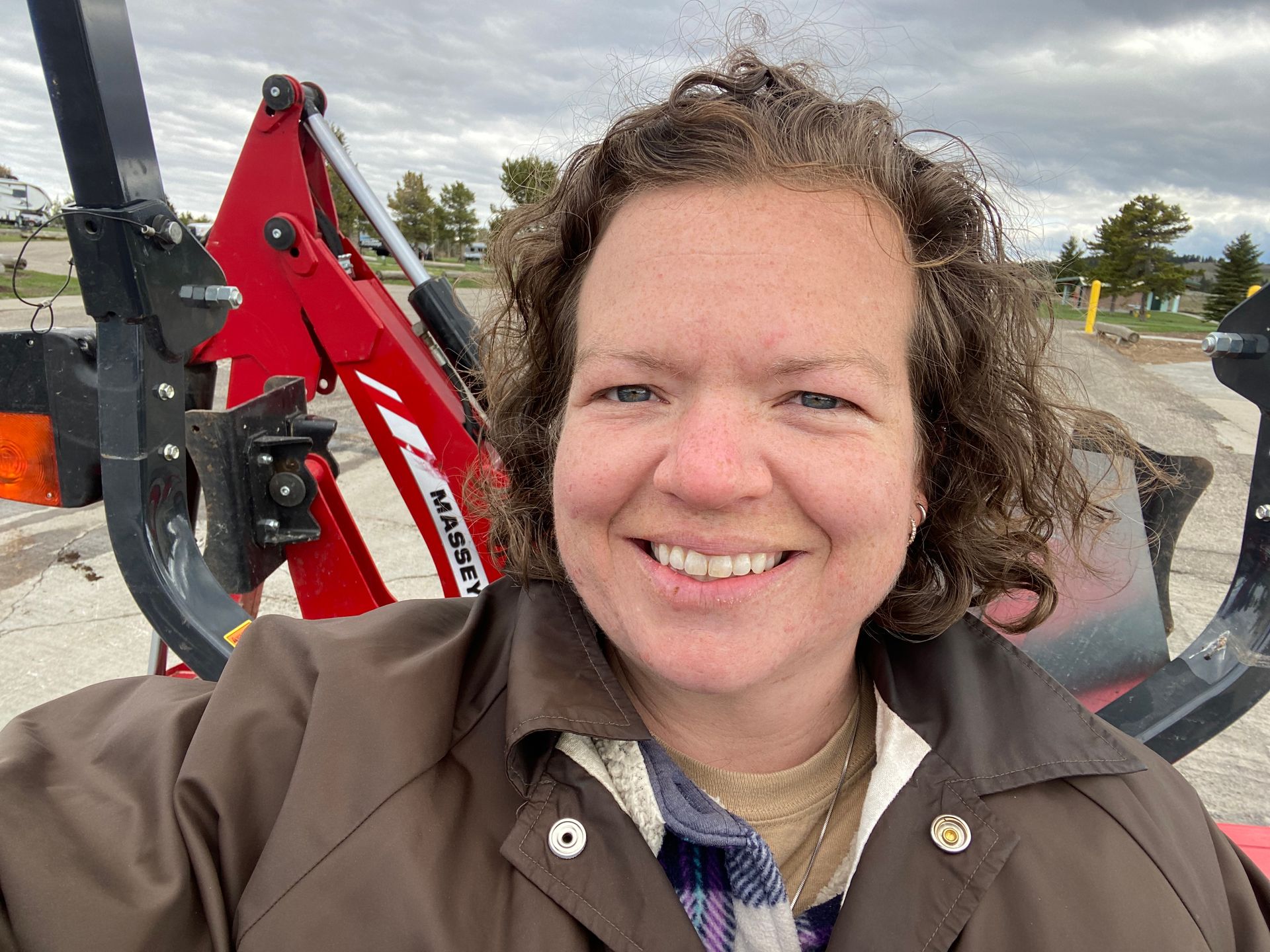
You’ve Landed an Interview, Now What?
Most workcamping interviews are conducted via Zoom, phone, or email. Here's how to nail it.
Be prepared to answer common questions:
- Why do you want this position?
- What's your RV setup? (type, length, self-contained?)
- What's your availability? Can you extend if needed?
- What experience do you have in customer service, maintenance, or hospitality?
- Are you comfortable working weekends or holidays?
Ask YOUR questions:
- What are the exact work hours and days?
- Is the campsite included? What hookups are provided (water, electric, sewer)?
- What's the pay structure? (Hourly? Stipend? Site trade only?)
- Is WiFi available and reliable?
- Where is the workamper site located? (Near bathrooms? In a quiet area?)
- Can we leave on our days off?
- What happens if we need to leave early?
- Are there other workcampers? (Community matters!)
Sometimes I like to throw in fun questions like, What would you say is the number one reason your workcampers don’t return? Or What is the least favorite thing to do at your campground and why? Its fun to throw the pressure back on them a little bit but also see how do they answer the question. Is it easy for them, are they honest or do they stumble over their words and give you vague answers. This will say a lot about who they are and what they will be like to work with.
Red flags to watch for:
- Vague job descriptions or unclear expectations
- Unreasonable hours (60+ hours/week for just a free site)
- No clear compensation structure
- Poor reviews from past workcampers (check Facebook groups or Workamper News)
- Managers who are dismissive or unprofessional during the interview
Make sure you are honest about everything! About your RV size, needs, and limitations. If your rig is 40 feet long, say so. If you can't work more than 30 hours a week, be upfront. Miscommunication leads to frustration on both sides.
Pro Tip:
A strong application, a personalized cover letter, and a professional interview can make all the difference. Be clear, be honest, and show genuine interest in the position. The best workcamping jobs go to people who are prepared, flexible, and enthusiastic.
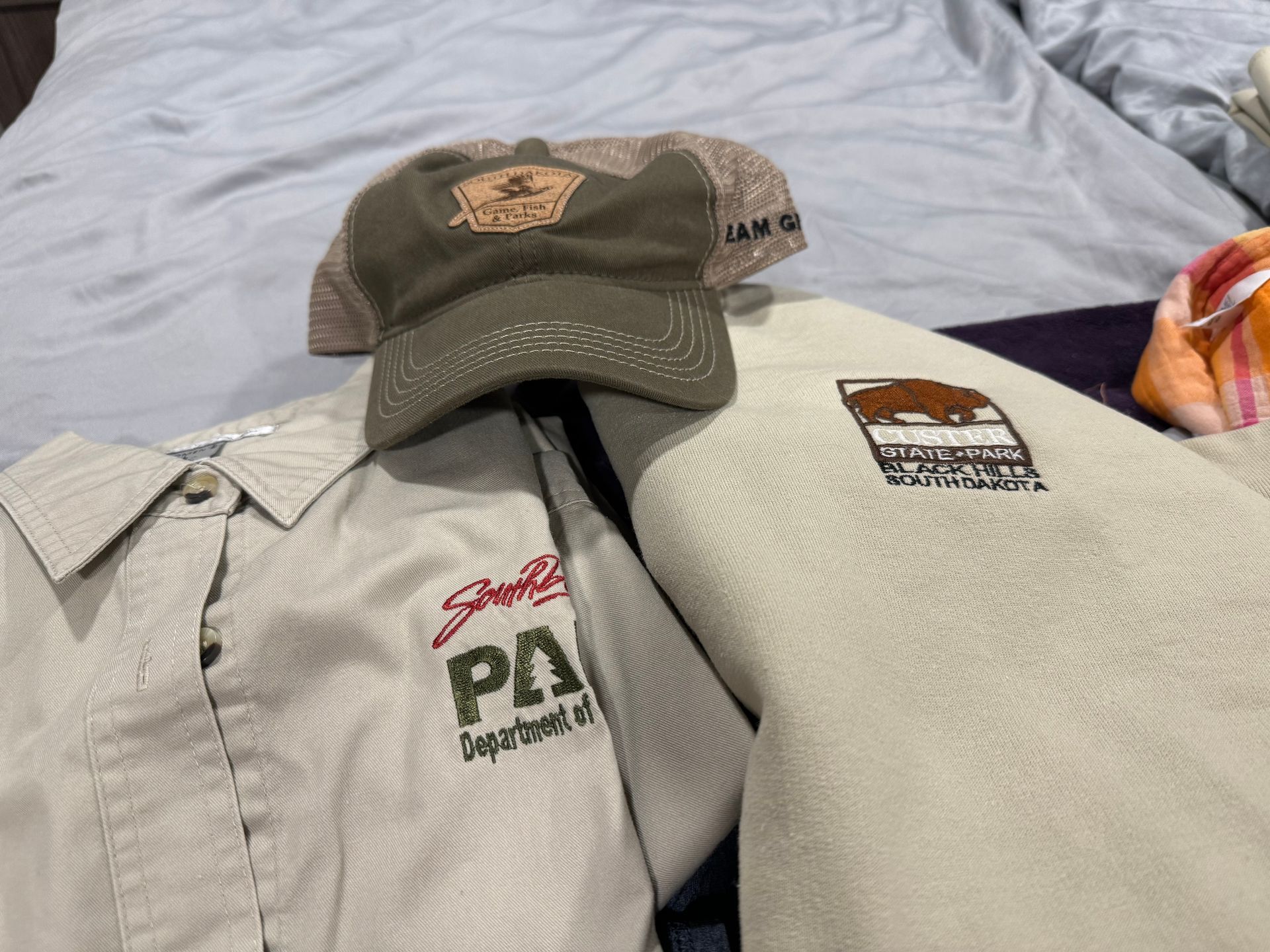
Workcamping For Beginners: What You Need to Know
If this is your first workcamping gig, start smart. A little preparation goes a long way in setting yourself up for success.
If This Is Your First Workcamping Gig:
Start with shorter commitments (1-2 months)
Don't commit to a full season right away. Test the waters with a shorter position to see if workcamping is right for you. You can always extend if you love it.
Choose beginner-friendly positions (camp host, front desk)
Avoid physically demanding roles like heavy maintenance or housekeeping until you know what you're getting into. Camp hosting and front desk work are great starting points.
Research the campground (read reviews from past workcampers)
Check Workamper News, Facebook groups, or ask around. Past workcampers will tell you the truth about management, workload, and living conditions.
Have a backup plan if it doesn't work out
What if the job isn't what you expected? Have a Plan B—another campground nearby, a friend's driveway, or a paid campground you can move to if needed.
Join workcamping Facebook groups for support
Connect with experienced workcampers who can answer questions, share advice, and offer encouragement. You're not alone—there's a whole community out there.
Do your research on the area too
Look beyond the campground. What kind of groceries are nearby? Will you have to drive 2 hours for supplies? What's the weather like? Understanding the area helps you prepare.
Essential Gear:
Basic tools
Screwdrivers, hammer, pliers, duct tape, zip ties—you'd be surprised how often these come in handy.
Good work boots
If you're doing any maintenance, groundskeeping, or outdoor work, invest in comfortable, durable boots.
Weather-appropriate clothing
Layers, rain gear, sun protection—be ready for whatever the weather throws at you.
Backup internet (if needed)
If you need reliable internet for personal use or communication, don't rely solely on campground WiFi. Bring a hotspot or backup plan.
Your first workcamping experience sets the tone for future gigs. Start small, do your homework, ask questions, and be prepared. The more you know going in, the smoother your experience will be—and the more likely you'll want to do it again.
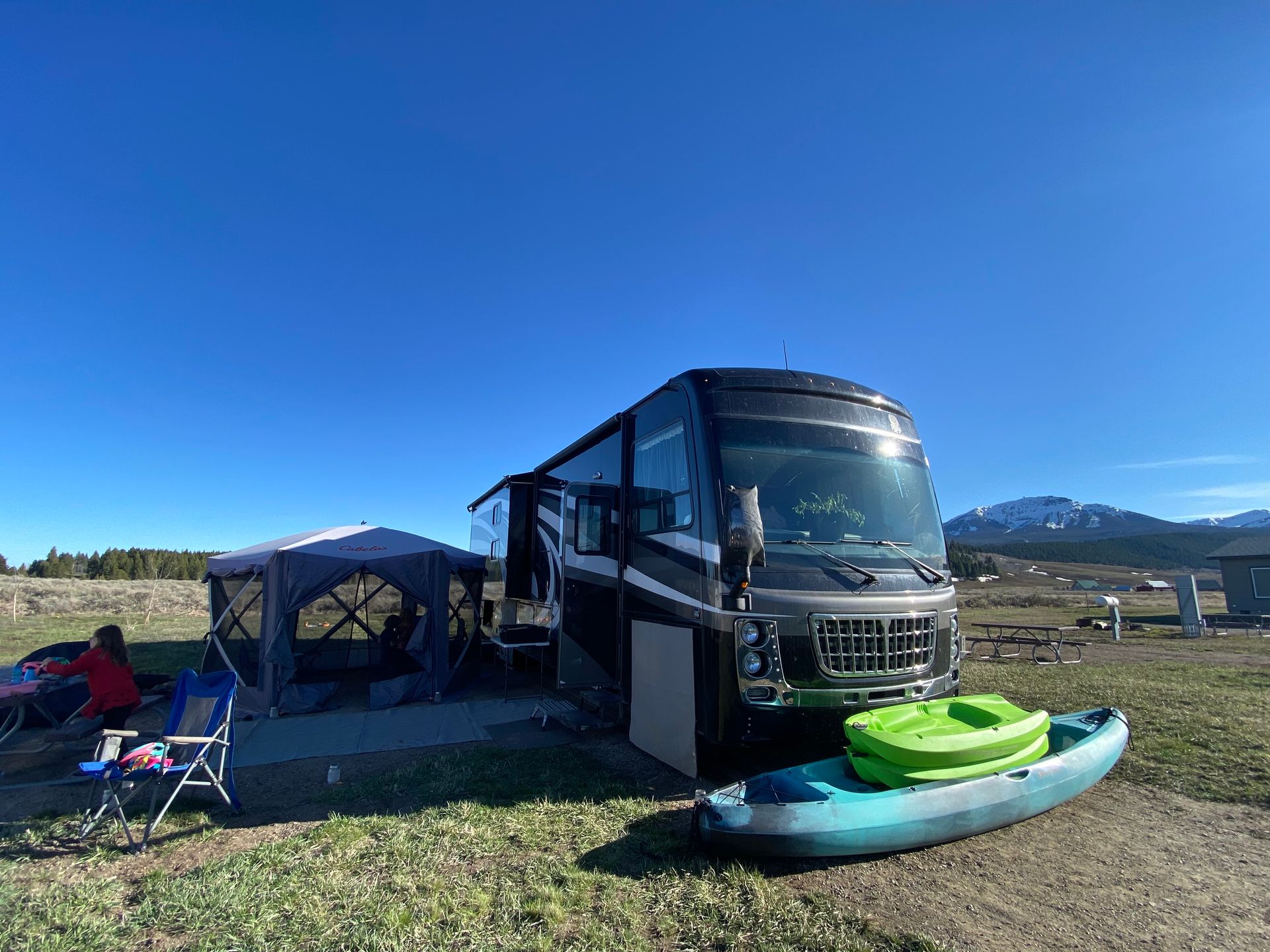
Budgeting for Workcamping
Workcamping can significantly reduce your travel costs, but it's not entirely free. Understanding what to budget for—and how workcamping saves you money—helps you plan realistically.
What to Budget For:
Fuel to get to the position
You'll need to drive to your workcamping location. Factor in current fuel prices and the distance you're traveling. If you're towing or driving a large motorhome, fuel costs can add up quickly.
Groceries and supplies
Even with a free campsite, you still need to eat. Research grocery stores near your workcamping location—some rural areas have limited options or higher prices. Budget accordingly.
RV maintenance
Tires, oil changes, brake checks, and unexpected repairs don't stop just because you're workcamping. Set aside money for routine maintenance and emergency fixes.
Personal expenses
Laundry, entertainment, dining out, phone bills, internet, insurance—life costs money even when camping is free. Don't forget these ongoing expenses.
Emergency fund
Always have a cushion. What if you need to leave early? What if your RV breaks down? An emergency fund (ideally $1,000-$3,000) gives you peace of mind and options.
How Workcamping Saves Money:
Free camping (biggest savings!)
A free campsite with hookups can save you $30-$100+ per night. Over a month, that's $900-$3,000 in your pocket. Over a season? Even more.
Income (even small stipends add up)
Many workcamping positions pay hourly wages on top of your free site. Even a modest $15/hour for 20 hours a week adds $1,200/month to your budget.
Explore areas you couldn't afford otherwise
Want to spend a summer in Yellowstone or the Grand Canyon? Workcamping makes bucket-list destinations affordable by eliminating (or drastically reducing) your camping costs.
Want More Workcamping Insights?
We recorded a bonus podcast episode to go along with this blog: Workcamping 101: Finding Your Perfect Seasonal Gig. We talk about everything from application tips to budgeting realities to red flags to watch for—plus real stories from our own workcamping experiences.
You can listen for FREE by joining our Patreon community as a free subscriber.
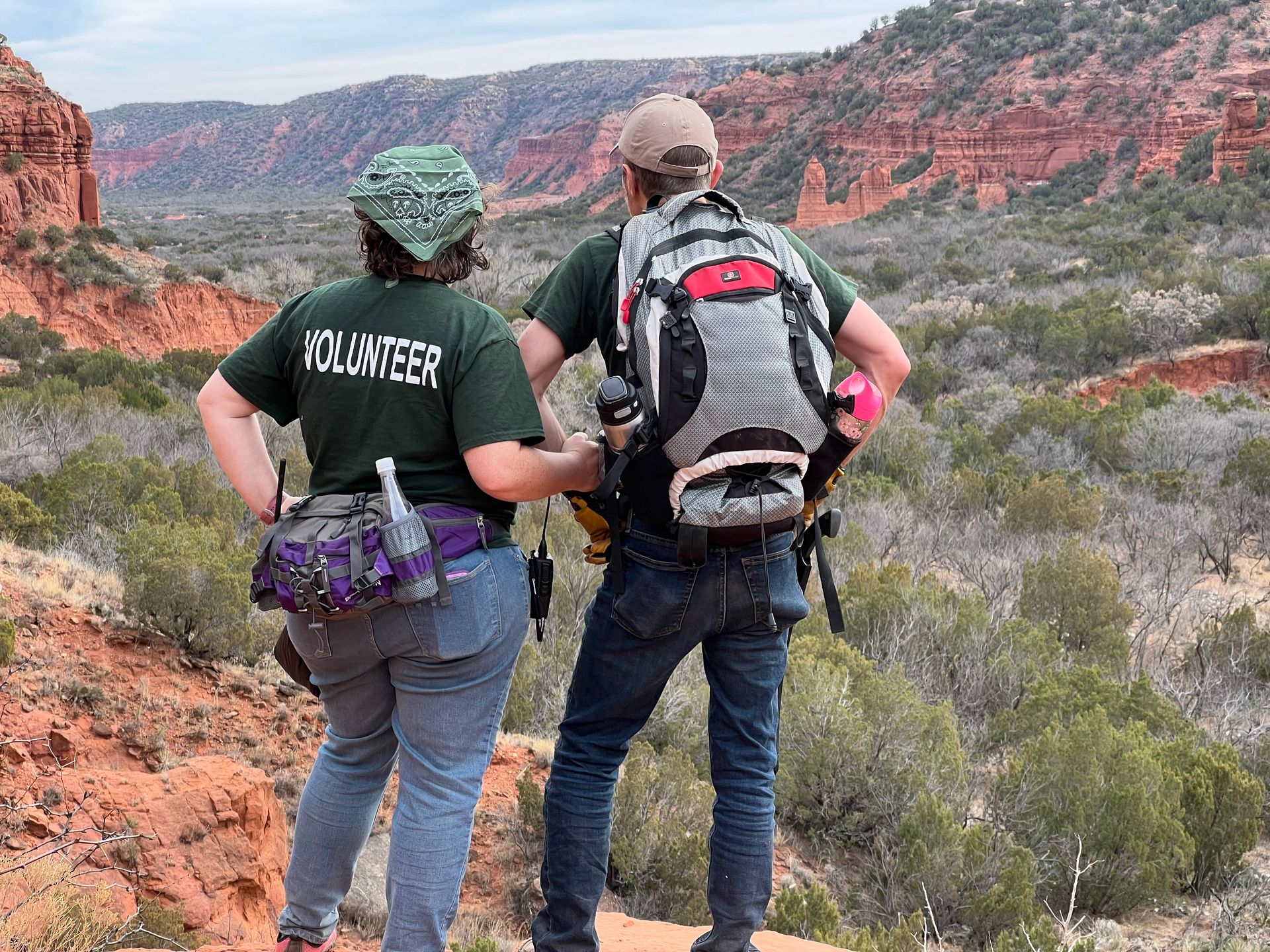
Your Workcamping Journey Starts NOW
Workcamping and camphosting offer an incredible way to travel the country, explore bucket-list destinations, and fund your RV lifestyle—all while being part of a welcoming community.
Here's what you need to remember:
The best positions fill up fast. Summer jobs are posted and filled in the fall and winter. Winter jobs fill in late spring and summer. If you want your pick of locations and positions, start your search early.
Action Steps to Get Started:
- Research job boards – Start with Workamper News, Workers on Wheels, and CoolWorks
- Apply to 5-10 positions – Cast a wide net to increase your chances
- Prepare your resume and references – Make sure they're ready to go
- Join workcamping communities – Facebook groups and forums are goldmines for advice and support
Remember:
Thousands of people are already living this lifestyle—and you can too. Whether you're a retiree looking for adventure, a couple wanting to stretch your travel budget, or someone seeking seasonal income on the road, workcamping opens doors.
Don't wait. The best positions won't last. Start researching, start applying, and start planning your next adventure.
Other blogs you might like...
